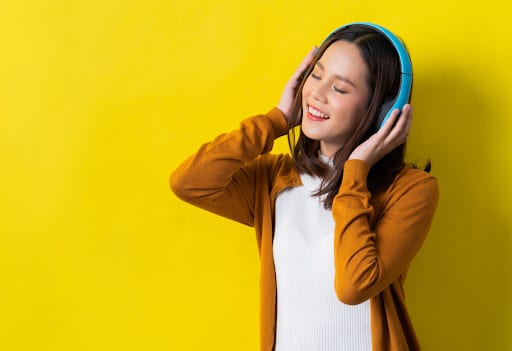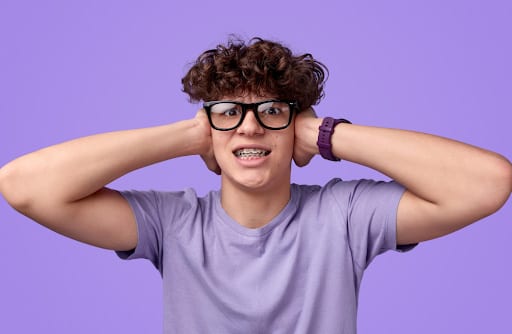Noise Reduction Hacks
When kids are overwhelmed, they can have a hard time focusing on the tasks in front of them. Whether it’s sitting in a Zoom class for remote learning or doing a worksheet in class, children often struggle with passive activities or work they don’t like to do and even more so if they have executive functioning difficulties or attention issues. During the best of times, some children have attention issues that impact their learning. Excessive stress can make the nervous system over-responsive, which could lead to over thought and worry. An excessive amount of worry can creep into your daily life – making it hard to focus. During the current pandemic, children and teens are dealing with an excessive amount of worry which means that even kids who normally focus well might be having attention issues. Kids’ nerves are stuck on overdrive and sensory experiences such as too much noise can produce intense reactions. Add fearful experiences such as the current pandemic, and you have even more reactivity.
Even if you think your home is quiet, the constant hum of electronics, the sound of traffic, and conversations in other rooms can be distracting for children. Even home design can impact the amount of noise pollution your child deals with. For example, open floor plans, high ceilings, and smooth surfaces like hardwood and tile floors amplify sound.
This is especially true for kids with misophonia. What is misophonia you might ask? Misophonia is a condition where a person has a severe sensitivity to specific sounds, even soft sounds. This sensitivity causes a range of emotions from anxiety to rage. Misophonia triggers are different from person to person but chewing and other mouth noises, humming, buzzing, etc. Those with anxiety or OCD have higher rates of Misophonia. Wondering if your child has anxiety? Check out this free download, Is it stress or anxiety? To learn more about pediatric obsessive compulsive disorder (OCD) and what OCD looks like in kids, read this blog.
Misophonia symptoms can interfere with your focus, so it is important to look at ways to reduce noise. Kids with ADHD are often very sensitive to noise because it is just another distraction for them.
The good news is that you don’t have to move or renovate your home to reduce noise pollution and sensory sensitivity. A lot of low cost or no-cost solutions exist. Whether you use these throughout the house or just in your child’s learning space, you can increase attention and boost learning with a few simple changes to the physical environment.

17 Noise Reduction Hacks
- Purchase a home environment monitoring device to track noise levels in your house
- Use rugs to help reduce noise in areas with high ceilings and hardwood floors
- Arrange furniture such as couches next to walls
- Use noise blocking curtains to reduce the noise from outdoors and insulate indoor areas better
- Purchase new, quieter appliances like vacuum cleaners, dishwashers, and air conditioners
- Buy silent alarm clocks that use light instead of sound
- Create a quiet, electronics-free zone for your child to spend time in
- Create an outdoor space where your child can focus just on the sound of nature
- Purchase noise-canceling headphones
- Move noisy electronics, like printers and computers, into one area of a room
- Invest in acoustic wall panels
- Use white noise to cancel out other sounds with either a phone app or a fan
- Hang fabric coverings on your walls
- Purchase roller shutters or outdoor blinds for your windows
- Install fences around your house to block outdoor noise
- Install solid wood doors in the house
- Plant trees if you live on a busy street
Always remember… “Calm Brain, Happy Family™”
Disclaimer: This article is not intended to give health advice and it is recommended to consult with a physician before beginning any new wellness regime.
Are you looking for SOLUTIONS for your child or teen struggling with executive functioning?
Dr. Roseann and her team are all about solutions for kids with EF issues who need blossoming, so you are in the right place!
Register for Dr, Roseann's FREE webinar, 5 Ways to Boost Your Child’s Executive Functioning and Attention at School, where Dr. Roseann will show you how to help your child or teen be more alert, listen, develop skills to be independent and self-sufficient and improve task completion.
Need help parenting a child with executive functioning issues, there are 3 ways to work with Dr. Roseann:
- In-person at her Ridgefield, CT center
- Virtually with her at home neurofeedback and coaching programs
- By getting her Get Unstuck Program
You can get her books for parents and professionals, including: It’s Gonna Be OK™: Proven Ways to Improve Your Child’s Mental Health, Teletherapy Toolkit™ and Brain Under Attack: A Resource For Parents and Caregivers of Children With PANS, PANDAS, and Autoimmune Encephalopathy.
Are you a professional who wants more training from Dr. Roseann? Purchase her book, Teletherapy Toolkit™: Therapist Handbook for Treating Children and Teens. If you are a business or organization that needs proactive guidance to support employee mental health or an organization looking for a brand representative, check out Dr. Roseann’s professional speaking page to see how we can work together. Dr. Roseann is a Children’s Mental Health Expert and Therapist who has been featured in/on hundreds of media outlets including, CBS, NBC, FOX News, PIX11 NYC, The New York Times, The Washington Post,, Business Insider, USA Today, CNET, Marth Stewart, and PARENTS. FORBES called her, “A thought leader in children’s mental health.”
She is the founder and director of The Global Institute of Children’s Mental Health and Dr. Roseann Capanna-Hodge. Dr. Roseann is a Board Certified Neurofeedback (BCN) Practitioner, a Board Member of the Northeast Region Biofeedback Society (NRBS), Certified Integrative Medicine Mental Health Provider (CMHIMP) and an Amen Clinic Certified Brain Health Coach. She is also a member of The International Lyme Disease and Associated Disease Society (ILADS), The American Psychological Association (APA), Anxiety and Depression Association of America (ADAA) National Association of School Psychologists (NASP), International OCD Foundation (IOCDF) International Society for Neurofeedback and Research (ISNR) and The Association of Applied Psychophysiology and Biofeedback (AAPB).
© Roseann-Capanna-Hodge, LLC 2021










